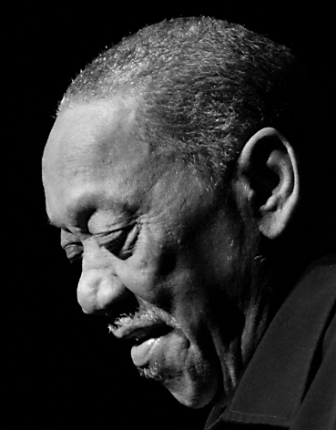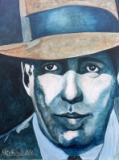Harlem Renaissance
In the early 1920's there was a movement called the "Negro" or "Harlem Renaissance". This resurgence of literature, knowledge, and the arts coming out of New York was powerful.

Bobby Bland earned his enduring blues superstar status the hard way: without a guitar, harmonica, or any other instrument to fall back upon. All Bland had to offer was his magnificent voice, a tremendously powerful instrument in his early heyday.
Bobby Bland discovered his own brand of the blues. It was a unique mixture of the gospel music he was singing in his church, the country & western music of the day, and that of some of the most popular musicians of that period. Along with some of his peers, Bobby "Blue" Bland would help foster this new blues sound, one that would eventually take him around the world singing in front of millions, put him in not one but two Halls of Fame, earn him a Grammy Lifetime Achievement award, and place him in the pantheon of one of the most beloved musical forms ever created.
Calvin Bland was born on January 27, 1930, in Rosemark Tennessee. Later moving to Memphis with his mother, Bland started singing with local gospel groups there, including amongst others the Miniatures. Eager to expand his interests, he began frequenting the city's famous Beale Street where he became associated with an ad hoc circle of aspiring musicians named "The Beale Streeters". He worked in a garage during the week and sang spirituals on weekends. At various times, he also served as a chauffeur for B.B. King and Roscoe Gordon and a valet for Junior Parker.
For all his promise, Bland's musical career ignited slowly. He was a founding member of the Beale Streeters, the fabled Memphis aggregation that also included B.B. King and Johnny Ace. Singles for Chess in 1951 (produced by Sam Phillips) and Modern the next year bombed, but that didn't stop local DJ David Mattis from cutting Bland on a couple of 1952 singles for his fledgling Duke logo. Duke was headed by hard-boiled Houston entrepreneur Don Robey, who provided top-flight bands for his artists. Scott soon became Bland's mentor, patiently teaching him the intricacies of phrasing when singing sophisticated fare
In the beginning, Bobby Bland styled himself after the likes of Roy Brown. After serving a stint in the army, however, Bland spent the latter half of the Fifties maturing into a masterful singer and assured entertainer. His hallmark was his supple, confidential soul-blues delivery. As a singer, Bland projected a grainy, down-to-earth quality, punctuated with guttural growls and snorts that would come to be known as the “chicken-bone sound.” Yet his voice was simultaneously smooth as velvet, allowing Bland to bring audiences under his hypnotic spell as he walked a fine line between passionate expression and exquisite self-control.
Most of Bland's savage Texas blues sides during the mid- to late '50s featured the slashing guitar of Clarence Hollimon, notably "I Smell Trouble," "I Don't Believe," "Don't Want No Woman," "You Got Me (Where You Want Me)," and the torrid "Loan a Helping Hand" and "Teach Me (How to Love You)." But the insistent guitar riffs guiding Bland's first national hit, 1957's driving "Farther Up the Road," were contributed by Pat Hare, another vicious picker who would eventually die in prison after murdering his girlfriend and a cop. Later, Wayne Bennett took over on guitar, his elegant fretwork prominent on Bland's Duke waxings throughout much of the '60s.
Bobby Bland had some stiff competition in the 60′s; his highest-charting song on the pop charts “Ain’t Nothing You Can Do” peaked at #20 during the same week The Beatles held the top 5 positions – but his real success came from the R & B charts where he is rated as the 13th best selling artist of that genre. But it was always the the blues that Bland is most known and beloved for. Bland was always pleased that the blues got a chance to make it as a musical genre despite it’s depressing reputation.
Financial pressures forced the singer to cut his touring band and in 1968 the group broke up altogether. His relationship with Scott, who died in 1979, was irrevocably severed. Nonetheless, depressed and increasingly dependent on alcohol, Bland weathered this unhappy period. He stopped drinking in 1971; his record company Duke was sold by owner Don Robey to the larger ABC Records group. This resulted in several successful and critically-acclaimed contemporary blues/soul albums including His California Album and Dreamer, arranged by Michael O'Martian and produced by ABC staff man Steve Barri. The albums, including the later "follow-up" in 1977 Reflections in Blue, were all recorded in Los Angeles and featured many of the city's top session en at the time.
In 1985, Bland was signed by Malaco Records, specialists in traditional Southern black music, who provided an empathetic environment and the singer has turned out a series of well-crafted albums in the ensuing years while continuing to tour and occasionally appear at concerts with fellow blues singer B. B. King. The two had collaborated for two albums in the 1970s. One of the finest singers in post-war blues,
Bland need not apologize for never quite achieving across-the-board popular acclaim that his influence and craft deserves (such as that of B.B. King and even Muddy Waters) but his devoted, primarily older, African-American soul-blues fan base are content with his historic legacy as it is. Despite occasional age-related ill-health, Bland continues to record new albums for Malaco, perform occasional tours alone and also with B.B. King, plus appearances at blues and soul festivals worldwide. A DVD of a 1990's Memphis nightclub performance is a popular Malaco title.
Since the mid-'80s, Bland has recorded for Jackson, MS's Malaco Records. His pipes undeniably reflect the ravages of time, and those phlegm-flecked "snorts" he habitually emits become annoying in large doses. But Bobby "Blue" Bland endures as a blues superstar of the loftiest order, resurfacing in 1998 with Memphis Monday Morning. Bland passed away June 23, 2013.
Don't miss a single page. Find everything you need on our complete sitemap directory.
Listen or read the top speeches from African Americans. Read more
Read about the great African Americans who fought in wars. Read more
African Americans invented many of the things we use today. Read more
Thin jazz, think art, think of great actors and find them here. Read more
Follow the history of Black Americans from slave ships to the presidency. Read more
Olympic winners, MVPS of every sport, and people who broke the color barrier. Read more
These men and women risked and sometimes lost their life to fight for the cause. Read more
Meet the people who worked to change the system from the inside. Read more

Visit my RedBubble page and use Michael Arnold Art to create greeting cards, T-shirts, mugs, and more.

The variety and impressive numbers of mammals, birds and marine wildlife in Alaska draw visitors from all over the world. For some travelers, Alaska is wilderness, at least compared to what they may know from back home. The pristine wilderness of Alaska is, perhaps, the last vestige of thriving populations of North American wildlife. Where else can you see polar bears, bald eagles, blue and humpbacked whales, gray wolves, grizzly bears, orcas, lynx, moose, and hundreds of other rare and endangered species in their original and undisturbed natural habitats?

Enjoy our website filled with original signed acrylic paintings by award winning Artist Michael Arnold. Located in Citrus County Florida, Michael Arnold is a the editor at the Citrus County Chronicle. When he's not busy being an editor, he is an avid artist who enjoys painting in a variety of styles. We hope you take the time to click on each image to see a larger view and to learn what the artist, Michael Arnold has to say about his paintings.

As dog owners and people who care deeply for animals and wildlife, we wanted our Dog Encyclopedia to be a website that could empower pet owners to create the most positive, loving environment for their dogs. Dog Encyclopedia realizes that owning a dog is like adding a new member to your family.

Floridian Nature has everything your are looking for in Florida nature. The wildlife of Florida is rich and varied, yet most of us are familiar with only a dozen or so species: the "well known endangered species such as manatees and panthers; those, like raccoons and squirrels, that have adapted to urban environments; the frightening alligators and black bears; and those like the armadillo who can't seem to cross the road. Yet they are just a few of the many animal species found in Florida.
